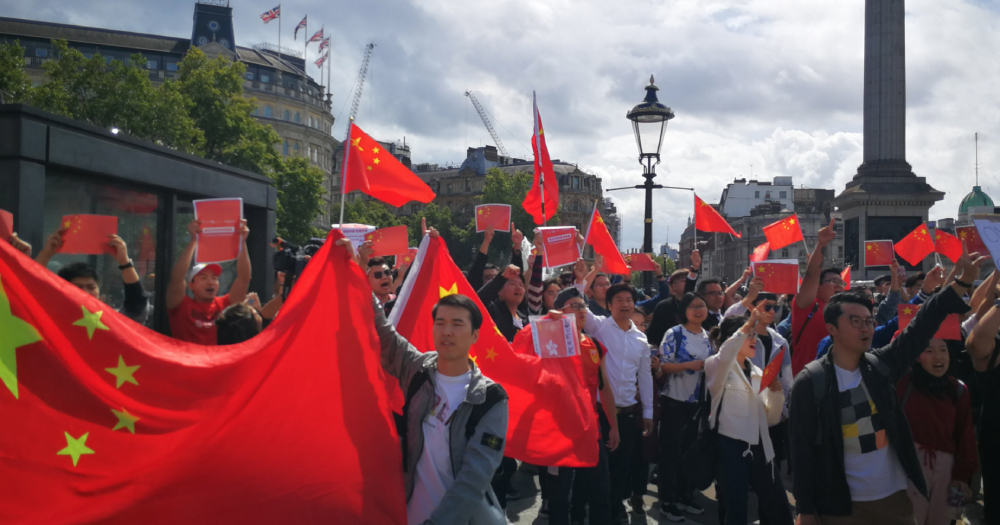A mainland Chinese who has been living in the United States for the past 10 years has provided a window into what mainland Chinese are thinking when they see Hongkongers protest.
Nationalistic comments from China are common
Ultra-nationalistic comments from tech-savvy Chinese netizens, made possible by the use of VPNs to jump over the "Great Firewall of China", tend to flood the Internet on news that is perceived to cast China in a bad light.
These commenters, echoing the official Beijing narrative, defend the Hong Kong police against the "rioters", who are seen as spoiled, good-for-nothing youngsters with a penchant for violence, and who are ruining Hong Kong with their misguided ways.
In addition, rallies by Hongkongers residing overseas have attracted equally heated responses from the mainland Chinese, who construe the cause of the Hong Kong people as advocating for Hong Kong independence.
Yaqiu Wang, a researcher at international non-governmental organisation Human Rights Watch, holds a different perspective regarding the situation. The Chinese national said she understood the psyche of these ultra-nationalists as she used to be one herself, in the past.
Could not understand why Tibetans were protesting
In an op-ed she wrote for the Los Angeles Times, Wang said that when she first arrived in Washington, D.C. to study in 2009, she could not understand why Tibetans in exile were protesting in front of the Chinese embassy.
She thought they were happy in China as the government had brought about development to the land with "high-speed trains and nice buildings".
But she later learnt from her Tibetan friends that they were fighting to save their language, culture and identity.
Even so, she said that it took "several years" for her to be able to understand the Tibetans' plight in China.
She opined that this was because she had no access to contrary perspectives as a result of government censorship.
Censorship deters self-reflective thinking
Wang went on to say that it was not easy for her and other Chinese nationals to process ideas contrary to what they believed and were taught their whole lives.
To her, it takes "an innate curiosity, constant reading of uncensored information and self-reflective thinking" in order to unlearn the propaganda she was taught and beliefs she held growing up.
And these traits are not encouraged in China, she said.
Furthermore, Wang said that even if mainland Chinese go overseas to study, they still rely on information obtained from China's "heavily censored" intranet.
Chinese students feel attacked
And when confronted by foreigners who say they have been "brainwashed by the Chinese government", Wang said they feel attacked by the "biased" and "hostile" westerners.
Such an inability to accept an alternative narrative, especially one that they were not exposed to growing up, contributes to them exhibiting extreme intolerance towards those who say otherwise.
Calm dialogue is needed
Nevertheless, Wang believes that it is important to continue interacting with Chinese students in a respectful, nonjudgmental manner, while keeping in mind that they might feel compelled to defend the Chinese government.
Not all mainland Chinese think the same
Although comments that condemn Hong Kong protesters tend to be the most prominent at the moment, differing views among the mainland Chinese towards these sensitive topics do exist, as with every other contentious issue.
Take for instance a recent incident in mainland China that involved the driver of a Rolls-Royce blocking emergency access to a hospital.
Mainland Chinese netizens, upon noticing the car plate that indicated the driver's privileged status in society, voiced their unhappiness with what they saw as corruption in the highest levels of government.
This prompted several of them to express their support for the Hong Kong protesters, saying they understood what Hongkongers are fighting for: that the special administrative region does not become a second mainland China.
Calmer voices
Less belligerent voices on Hong Kong exist too.
For instance, a Weibo user from the mainland who once studied in a university in Hong Kong wrote his observations on how the youth in Hong Kong feel their future is bleak, and have nowhere else to retreat to.
Mainlanders, on the other hand, can afford to return to their hometowns if they fail to succeed in first-tier, or even second-tier cities.
He also pointed out that regardless of how much they struggle, youngsters can never afford housing in a city where property prices are controlled by real estate tycoons.
On the topic of ultra-nationalism, another Weibo user also wrote that no matter how patriotic a person is, he or she should still try to think as an independent person, and not be led by sentiments or give in to frenzy.
The user’s post received more than 65,000 upvotes.
Naturally, not everyone agreed with what they said.
But the posts go to show that not all mainland Chinese are necessarily taken in by the overarching narrative promoted by the establishment.
Nevertheless, the growing number of Chinese students who return to the mainland shows that the Western concept of political freedom is not all that attractive, especially when pit against better economic prospects and stability.
Love for homeland = loyalty towards Party?
Oftentimes, the Chinese Communist Party stirs up nationalism among mainland Chinese by conflating love for their homeland with support and loyalty towards the Party.
This is why it is not strange for the Chinese authorities to censor dissenting voices and promote its singular narrative on Hong Kong.
But while the Party lets nationalistic expressions enjoy free rein on the Chinese Intranet, Chinese nationalism can be a double-edged sword for the ones wielding it.
If not kept under control, it can go out of hand, and even challenge the party, especially if the party is seen as not being assertive enough in its foreign policy when it comes to protecting China’s interests.
Related articles:
Top image via CGTN
If you like what you read, follow us on Facebook, Instagram, Twitter and Telegram to get the latest updates.
